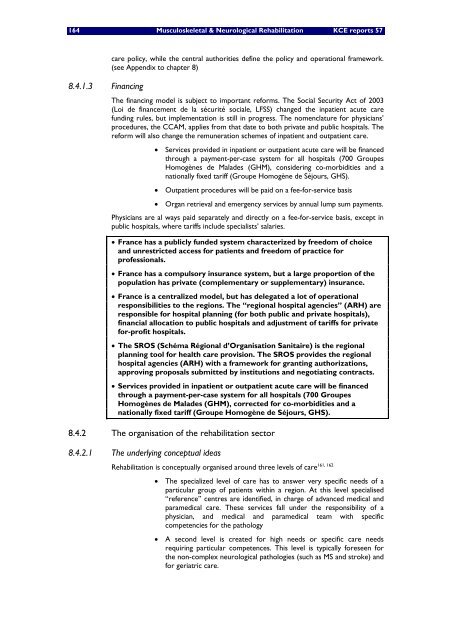The report is available in English with a French summary - KCE
The report is available in English with a French summary - KCE
The report is available in English with a French summary - KCE
Create successful ePaper yourself
Turn your PDF publications into a flip-book with our unique Google optimized e-Paper software.
164 Musculoskeletal & Neurological Rehabilitation <strong>KCE</strong> <strong>report</strong>s 57<br />
8.4.1.3 F<strong>in</strong>anc<strong>in</strong>g<br />
care policy, while the central authorities def<strong>in</strong>e the policy and operational framework.<br />
(see Appendix to chapter 8)<br />
<strong>The</strong> f<strong>in</strong>anc<strong>in</strong>g model <strong>is</strong> subject to important reforms. <strong>The</strong> Social Security Act of 2003<br />
(Loi de f<strong>in</strong>ancement de la sécurité sociale, LFSS) changed the <strong>in</strong>patient acute care<br />
fund<strong>in</strong>g rules, but implementation <strong>is</strong> still <strong>in</strong> progress. <strong>The</strong> nomenclature for physicians’<br />
procedures, the CCAM, applies from that date to both private and public hospitals. <strong>The</strong><br />
reform will also change the remuneration schemes of <strong>in</strong>patient and outpatient care.<br />
• Services provided <strong>in</strong> <strong>in</strong>patient or outpatient acute care will be f<strong>in</strong>anced<br />
through a payment-per-case system for all hospitals (700 Groupes<br />
Homogènes de Malades (GHM), consider<strong>in</strong>g co-morbidities and a<br />
nationally fixed tariff (Groupe Homogène de Séjours, GHS).<br />
• Outpatient procedures will be paid on a fee-for-service bas<strong>is</strong><br />
• Organ retrieval and emergency services by annual lump sum payments.<br />
Physicians are al ways paid separately and directly on a fee-for-service bas<strong>is</strong>, except <strong>in</strong><br />
public hospitals, where tariffs <strong>in</strong>clude special<strong>is</strong>ts’ salaries.<br />
• France has a publicly funded system characterized by freedom of choice<br />
and unrestricted access for patients and freedom of practice for<br />
professionals.<br />
• France has a compulsory <strong>in</strong>surance system, but a large proportion of the<br />
population has private (complementary or supplementary) <strong>in</strong>surance.<br />
• France <strong>is</strong> a centralized model, but has delegated a lot of operational<br />
responsibilities to the regions. <strong>The</strong> “regional hospital agencies” (ARH) are<br />
responsible for hospital plann<strong>in</strong>g (for both public and private hospitals),<br />
f<strong>in</strong>ancial allocation to public hospitals and adjustment of tariffs for private<br />
for-profit hospitals.<br />
• <strong>The</strong> SROS (Schéma Régional d’Organ<strong>is</strong>ation Sanitaire) <strong>is</strong> the regional<br />
plann<strong>in</strong>g tool for health care prov<strong>is</strong>ion. <strong>The</strong> SROS provides the regional<br />
hospital agencies (ARH) <strong>with</strong> a framework for grant<strong>in</strong>g authorizations,<br />
approv<strong>in</strong>g proposals submitted by <strong>in</strong>stitutions and negotiat<strong>in</strong>g contracts.<br />
• Services provided <strong>in</strong> <strong>in</strong>patient or outpatient acute care will be f<strong>in</strong>anced<br />
through a payment-per-case system for all hospitals (700 Groupes<br />
Homogènes de Malades (GHM), corrected for co-morbidities and a<br />
nationally fixed tariff (Groupe Homogène de Séjours, GHS).<br />
8.4.2 <strong>The</strong> organ<strong>is</strong>ation of the rehabilitation sector<br />
8.4.2.1 <strong>The</strong> underly<strong>in</strong>g conceptual ideas<br />
161, 162<br />
Rehabilitation <strong>is</strong> conceptually organ<strong>is</strong>ed around three levels of care<br />
• <strong>The</strong> specialized level of care has to answer very specific needs of a<br />
particular group of patients <strong>with</strong><strong>in</strong> a region. At th<strong>is</strong> level special<strong>is</strong>ed<br />
“reference” centres are identified, <strong>in</strong> charge of advanced medical and<br />
paramedical care. <strong>The</strong>se services fall under the responsibility of a<br />
physician, and medical and paramedical team <strong>with</strong> specific<br />
competencies for the pathology<br />
• A second level <strong>is</strong> created for high needs or specific care needs<br />
requir<strong>in</strong>g particular competences. Th<strong>is</strong> level <strong>is</strong> typically foreseen for<br />
the non-complex neurological pathologies (such as MS and stroke) and<br />
for geriatric care.

















